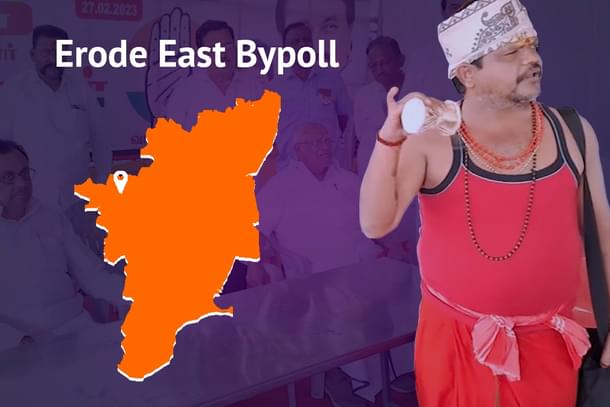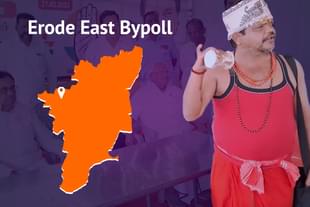Politics
Tamil Nadu: Is Erode Model Replacing Thirumangalam Formula? Opposition Accuses Ruling DMK Of Pioneering New Cash Distribution Method For Bypoll
Swarajya Staff
Feb 20, 2023, 01:12 PM | Updated 05:13 PM IST
Save & read from anywhere!
Bookmark stories for easy access on any device or the Swarajya app.


Accusing the ruling Dravida Munnetra Kazhagam (DMK) of preventing them from reaching out to the electorate in the Erode East Assembly constituency, the opposition All India Anna Dravida Munnetra Kazhagam (AIADMK) has said that DMK functionaries are confining voters in several pockets of the town in temporary shelters where cash is doled out, and meals served three times a day.
“The ruling DMK men have erected shamianas at all booths and confined the voters who are served food and given cash daily. The Election Commission of India should take immediate steps to remove the shamianas and free the voters,” senior AIADMK leader and former minister C Ve Shanmugam told local media.
While the ruling DMK men met voters and garnered votes, the AIADMK was not allowed to canvass, he added.
“The Election Commission has not deleted the names of 40,000 ineligible voters from the roll. It is functioning like the election wing of the DMK,” Shanmugam, currently a Rajya Sabha member, further alleged.
“Two observers were appointed for the constituency, but it is not known where they are. The district officials and police are under the control of the DMK ... Every party has a democratic right to seek votes,” he said and sought steps to ensure a free and fair poll.
In a letter written to the Chief Election Commissioner (CEC), Bharatiya Janata Party (BJP) state president, K Annamalai, also accused the DMK of bribing voters with two kilograms of meat and cash in a bid to win the Erode East bypoll
The amount of cash depended on the voter’s willingness to abide by the party’s requirements. For sitting at a designated place for a day, a voter is paid Rs 1000, and if he sits so for 20 days, he is paid Rs 5000, Annamalai said.
The letter comes a few days after tokens allegedly used for cash distribution were seized from Sarbudeen, the DMK South Union treasurer in Tiruppur.
Earlier in January, the BJP released a video in which senior DMK minister KN Nehru was seen talking to Congress candidate EVKS Elangovan about the distribution of money and gifts.
Annamalai added that while his party had complained to the State Election Commission (SEC) soon after the video was out, the SEC was yet to take any action and this had forced him to write to the CEC to ensure a free and fair election.
Many political observers in the state have also pointed out the unprecedented scale of cash distribution in the run-up to Erode East bypoll. While they point out that bribing voters with cash is a common phenomenon in state electoral politics, especially on voting day, the stark difference this time is multiple rounds of cash distribution and confining voters in halls to secure them from opposition allurement.
Even though its candidate is not in the fray, the ruling DMK is pulling out all the stops to ensure the victory of the United Progressive Alliance (UPA) candidate and veteran Congress leader Elangovan.
The byelections in Tamil Nadu are generally one-sided contests as ruling parties win with huge margins backed by money and muscle power. However, the ruling DMK is facing significant anti-incumbency very early in its tenure due to a series of unpopular measures and lackadaisical governance. It fears that an underwhelming performance in the byelection will add further credibility to the widely prevalent perception of ‘poor governance’.
The model of large-scale money distribution in byelections was pioneered and executed for the first time by DMK’s MK Alagiri, son of the late chief minister M Karunanidhi, in what is now infamously known as the ‘Thirumangalam Formula’.
Before Chief Minister MK Stalin managed to completely outwit Alagiri in the race to succeed their father Karunanidhi as the DMK supremo, the brothers (Stalin and Alagiri) were engaged in a bitter stand-off.
Though Alagiri is the elder of the two siblings, Karunanidhi always favoured Stalin to succeed and inducted Alagiri into politics only around 2004. Alagiri was assigned the task of strengthening the party in southern districts, which was a huge area of weakness for the party hit by an exodus of veterans who shifted allegiance to the Marumalarchi Dravida Munnetra Kazhagam (MDMK) formed by rebel leader V Gopalaswami aka Vaiko.
In 2009, a byelection was held in Thirumangalam, a suburb of Madurai. A victory was guaranteed for the DMK, but Alagiri wanted to demonstrate his strength to impress his father, who was then the chief minister of Tamil Nadu. Alagiri is said to have mobilised the party machinery to ensure the distribution of money to every household in the constituency. Many political observers alleged that the number of votes in each house was counted, and cash was stuffed, at the rate of Rs 500, in an envelope and delivered to every home.
DMK candidate and Alagiri loyalist Latha Adhiyaman won with a thumping margin of 39,266 votes. The then CM Karunanidhi quickly claimed the verdict as a vindication of DMK’s ‘golden rule’.
Both political parties subsequently mainstreamed the ‘Thirumangalam formula’.
In the tightly-contested 2016 state assembly polls, it was widely believed that the Jayalalithaa-led ruling AIADMK could retain power on the back of massive cash distribution, especially by targeting voters in constituencies that saw tough battles with opposition DMK.
Days ahead of the 2016 polls, the Election Commission (EC) countermanded the election to the Aravakurichi constituency over brazen misuse of money power by the then AIADMK candidate Senthil Balaji and his DMK opponent, who was also a resourceful local businessman.
Balaji has since switched political allegiance to DMK and is a powerful minister in the state cabinet. He is now spearheading the party’s campaign in Erode East and has been accused of orchestrating massive cash distribution.
The RK Nagar byelection in 2017 also earned notoriety for large-scale cash distribution.
The seat was vacant after the death of AIADMK supremo Jayalalithaa, and two party factions were locked in a bitter power struggle. TTV Dhinakaran was fielded as the candidate by the Sasikala faction. The distribution of mind-boggling sums of money to bribe voters forced the Election Commission to countermand the election.
The Election Commission eventually scheduled the byelection for RK Nagar the same year. Still, Dhinakaran, this time contesting as an Independent, trounced the candidates of both the ruling AIADMK and the DMK. It was alleged that Dhinakaran’s camp gave every voter a specially marked Rs 20 note, saying it can be exchanged for a hefty amount later, since the EC had tightened security in the constituency.





